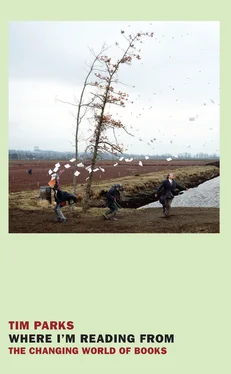Do I keep the long sentences, then, or break them up? Do I make the book more comprehensible for English readers than it is for present-day Italian readers (for whom footnotes giving a modern Italian paraphrase are often provided)? Above all, do I allow all those Latinisms to come through in the English, which would inevitably give the text a more formal, austere feel, or do I go for Anglo-Saxon monosyllables and modern phrasal verbs to get across the curiously excited intimacy of the text, like someone building up very complex, often provocative ideas as he goes along, with no one at hand to demand explanations or homogeneity or any sort of order?
Here, for example, is a brief and by Leopardi’s standards very simple entry on hope and suicide:
La speranza non abbandona mai l’uomo in quanto alla natura. Bensì in quanto alla ragione. Perciò parlano stoltamente quelli che dicono (gli autori della Morale universelle t.3.) che il suicidio non possa seguire senza una specie di pazzia, essendo impossibile senza questa il rinunziare alla speranza ec. Anzi tolti i sentimenti religiosi, è una felice e naturale, ma vera e continua pazzia, il seguitar sempre a sperare, e a vivere, ed è contrarissimo alla ragione, la quale ci mostra troppo chiaro che non v’è speranza nessuna per noi. [23. Luglio 1820.]
Do I write:
Hope never abandons man in relation to his nature, but in relation to his reason. So people (the authors of La morale universelle , vol. 3) are stupid when they say suicide can’t be committed without a kind of madness, it being impossible to renounce all hope without it. Actually, having set aside religious sentiments, always to go on hoping is a felicitous and natural, though true and continuous, madness and totally contrary to reason which shows too clearly that there is no hope for any of us. [July 23, 1820]
Or alternatively:
Men never lose hope in response to nature, but in response to reason. So people (the authors of the Morale universelle , vol. 3) who say no one can kill themselves without first sinking into madness, since in your right mind you never lose hope, have got it all wrong. Actually, leaving religious beliefs out of the equation, our going on hoping and living is a happy, natural, but also real and constant madness, anyway quite contrary to reason which all too clearly shows that there is no hope for any of us. [July 23, 1820]
Or some mixture of the two? The fact is that while I find it hard to imagine translating Dante’s famous Lasciate ogni speranza any other way than “Abandon all hope” (curiously introducing this rather heavy verb, abandon , where in the Italian we have a simple lasciare , to leave), here I just can’t imagine any reason for not reorganizing La speranza non abbandona mai l’uomo into “Man never loses hope.”
And if I leave dangling modifiers like “having set aside religious sentiments,” am I going to find an editor intervening as if I’d simply made a mistake? If I warn the editor that there will be dangling modifiers because Leopardi doesn’t worry about them, does that mean that I can then introduce them myself where Leopardi doesn’t?
All these decisions are further complicated by the fact that as I began my translation of two hundred pages of extracts, a team of seven translators, and two specialist editors, based in Birmingham, England, and largely sponsored by, of all people, Silvio Berlusconi, completed the first unabridged and fully annotated English edition of the Zibaldone , a simply enormous task. Their version had not yet been published at this point (by Farrar, Straus and Giroux in the United States) but I had a proof copy. Do I look at it? Before I start? Or only after I finish, to check that at least semantically we have understood the same thing?
Well, certainly the latter and with due acknowledgement of course; there is absolutely no point in my publishing a version with mistakes that could have been avoided by checking my attempt against theirs, as quite possibly they will have been checking theirs against the recent French version. On the other hand, there is equally no point in my producing a translation that is merely an echo of theirs. I’d be wasting my time. This kind of translation just doesn’t pay enough for you not to need some other incentive: the crumb of glory that might accrue from producing a memorable Leopardi.
I decide to look at the Translator’s Note in the new edition, and perhaps a few parts of the translation that don’t correspond to the extracts I’m supposed to be translating, just to get a sense of how they’ve dealt with the various issues of style. Immediately I realize that these translators faced an even greater dilemma than I do. Seven translators and two editors will each have heard Leopardi’s highly idiosyncratic voice and responded to his singular project, his particular brand of despair, in his or her own way; but one can’t publish a text with seven (or nine) different voices. Strategies must have been agreed on, and a single editor must ultimately have gone through all two-thousand-plus pages to even things out. This means establishing a standard voice that all the translators can aim for and making certain decisions across the board, particularly with respect to key words, the overall register, lexical fields, and so on. In any event, after reading a few paragraphs of the translation itself I’m reassured that my work will not merely be a duplication of theirs, because I hear the text quite differently.
Here the reader will want me to characterize this difference, perhaps with a couple of quotations. And the temptation would be for me to show something I could criticize and to draw the reader onto my side to support some supposedly more attractive approach. But I don’t want to do that. I’m frankly in awe of the hugeness of this team’s accomplishment and aware that they have done things the only way they could to offer a complete translation of the whole text.
What I’d rather like to stress is my intense awareness, as I read their translation, of each reader’s response, which is the inevitable result, I suppose, of the individual background we bring to a book, all the reading and writing and listening and talking we’ve done in the past, our particular interests, beliefs, obsessions. I hear the writer in an English that has a completely different tone and feel than the one that emerges from my colleague’s collective efforts. It’s just a different man speaking to me—a different voice—though the Leopardi I hear is no more valid than the Leopardi—or Leopardis—they hear.
FIFTEEN YEARS OF diary entries. From 1817 to 1832. Some just a couple of lines. Some maybe a thousand words. At a rhythm ranging from two or three a day to one a month, or even less frequent. Suddenly, it occurs to me that if Leopardi were writing his Zibaldone today, it would most likely be a blog. Immediately, the thought threatens to affect the way I am translating the work. I am imagining the great diary as the Ziblogone —the big blog—launched from some eccentric little website in the hills of central Italy. I’m wondering if I should suggest to the publishers (Yale University Press) that they might put the entries up one a day on their site; they could use Leopardi’s own system of cross-referencing his ideas to create a series of links. Fantastic! Perhaps I could start embedding the links as I work. Why not?
It is impossible to translate a work from the past and not be influenced by what has happened since. Or at least to feel that influence, if only to resist it. I translated Machiavelli’s The Prince during the Iraq War. States invading distant foreign countries with authoritarian governments, Machiavelli warned, should think twice about disbanding the army and bureaucracy that opposed them, since these institutions may offer the best opportunity of maintaining law and order after the war is over. I remember wanting to translate this observation in such a way that even the obtuse Mr. Bush simply could not miss the point. If I could have sneaked in the word Iraq —or perhaps more feasibly shock and awe —I would have.
Читать дальше












